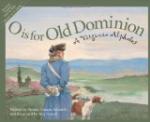In some way that only those who know the laze of houseboating can understand, the hours slipped by in that tiny, tucked-away haven, and it was the middle of the afternoon when Gadabout slowly felt her way out from behind the island and started up the James in the wake of the Sarah Constant, the Goodspeed, and the Discovery. That historic wake we were to follow for the first thirty miles of our journey, when it would bring us to the spot on the bank of the river where those first colonists landed and built their little settlement which (still honouring an unworthy king) they called James Towne.
As Gadabout sturdily headed her stubby bow up the wide, majestic waterway, we looked about us. After all, what had three centuries done to this gateway of American civilization? Surely not very much. Keeping one’s eyes in the right direction it was easy to blot out three hundred years, and to feel that we were looking upon about the same scene that those first colonists beheld—just the primeval waste of rolling waters, lonely marsh, and wooded shore.
But eyes are unruly things; and, to be sure, there were other directions in which to look. Glances northward took in a scene different enough from the one that met the eyes of those early voyagers.
Upon the low point of land along which they at last found a channel into the James and which (in their relief) they named Point Comfort, now stood a huge modern hostelry.
To the left of this, the ancient shore-line was now broken by a dull, square structure that reared its ugly bulk against the sky—a strangely grim marker of the progress of three centuries. For this was the grain elevator at Newport News, spouting its endless stream to feed the Old World, and standing almost on the spot where those first settlers in the New World, sick and starving, once begged and then fought the Indians for corn. Lying in the offing were great ships from overseas that had come to this land of the starving colonists for grain.
Beyond all these could be seen something of the town of Newport News itself. Towers and spires and home smoke-wreaths we saw, where those beginners of our country saw only the spires of the lonely pines and the smoke from hostile fires.
As our houseboat skirted the southern shore of the James in the sunny afternoon, our engines chugging merrily, our flags flying, and our two trailing rowboats dancing on the boiling surge kicked up astern, we felt that our cruise was well begun. Not that we were misled for a moment by that boiling surge astern into the belief that we were making much progress. We had early perceived that Gadabout made a great stir over small things, and that she went faster at the stern than anywhere else.
Yet all that was well enough. So long as the sun shines and the water lies good and flat, dawdling along in such a craft is an ideal way to travel. If the houseboat is built with the accent on the first syllable, as it ought to be, the homey feeling comes quickly to the family group aboard. Day after day brings new scenes and places, yet the family life goes on unbroken. It is as though Aladdin had rubbed the wonderful lamp, and the old home had magically drifted away and started out to see what the world was like.




